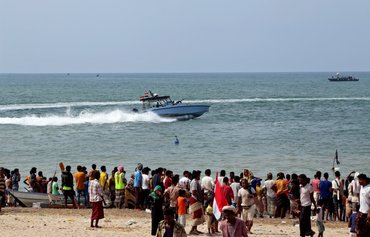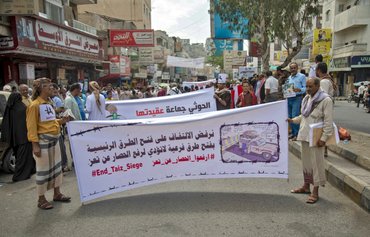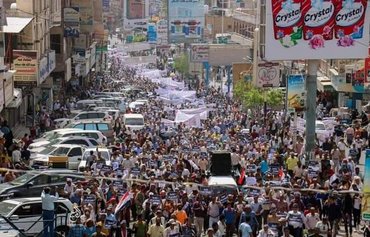ADEN -- A renewed truce in Yemen between the warring sides has brought hope that a permanent ceasefire is within reach, but continued violations by the Houthis, with backing from the Iranian regime, have darkened the prospects.
On June 2, the parties to the conflict agreed to a two-month extension of the initial truce agreement, which had been in place since April 2.
However, the Yemeni army has warned that the Houthis were sending major reinforcements to different battlefronts, in clear disregard of peace efforts and the nationwide truce, Asharq al-Awsat reported Friday (June 10).
Military spokesman Brig. Gen. Abdo Majali said the Houthis have committed thousands of violations of the truce since it was renewed last week.
![Yemenis arrive at Sanaa airport on May 16 to take the first flight from Sanaa to the Jordanian capital, Amman, since a truce went into effect on April 2. [Sanaa International Airport Administration]](/cnmi_am/images/2022/06/10/35672-yemen-truce-travel-600_384.jpg)
Yemenis arrive at Sanaa airport on May 16 to take the first flight from Sanaa to the Jordanian capital, Amman, since a truce went into effect on April 2. [Sanaa International Airport Administration]
![A Yemenia plane prepares to fly to Amman from Sanaa on May 16, the first commercial flight since a truce went into effect April 2. [Sanaa International Airport Administration]](/cnmi_am/images/2022/06/10/35673-yemen-first-flight-600_384.jpg)
A Yemenia plane prepares to fly to Amman from Sanaa on May 16, the first commercial flight since a truce went into effect April 2. [Sanaa International Airport Administration]
The militia has brought in more fighters, weapons and military equipment to the frontlines, including tanks and armoured vehicles, he said, and is flying armed drones, setting up new military positions and deploying snipers.
The Houthis have also planted mines in civilian areas and on the frontlines, he added.
Violations have been confirmed in Marib province, the west coast, and eastern and western Taez, Majali said.
The Houthis have also fired artillery at the army and attempted infiltrations that have been repelled by the military, according to the paper.
Majali stressed the army's commitment to the truce, adding that the Houthi violations are "an act of defiance of the United Nations (UN) and international humanitarian law".
Some are even suggesting the Houthis are using the truce to recruit more soldiers, even children, despite the group's April commitment with the UN to end the recruitment and use of children in the conflict.
Welcoming peaceful solutions
UN special envoy to Yemen Hans Grundberg arrived in Houthi-held Sanaa on Wednesday for talks with the group's leaders on reopening routes to Taez, a city under Houthi blockade that has proved the thorniest problem in implementing the truce, AFP reported.
Taez has been largely cut off since 2015.
Holding talks on Taez was one of the terms of the truce, along with resuming commercial flights out of Sanaa and allowing fuel ships into the lifeline port of al-Hodeidah, which is also under Houthi control.
Flights have now resumed from Sanaa to Amman and Cairo, and tankers have docked in al-Hodeidah in an attempt to ease fuel shortages.
Grundberg hailed the truce extension, calling it a "positive signal of the parties' seriousness to uphold and implement the truce".
"Yemenis have seen the truce's tangible benefits," he said. "We have witnessed a significant positive shift and we have a responsibility to safeguard it and deliver on its potential for peace in Yemen."
The UN Security Council also welcomed the extension of the truce in Yemen but expressed "concern about the grave humanitarian impact of the continued road closures around Taez".
It called on the Houthis to "act with flexibility in the negotiations, and immediately open the main roads".
'Tired of the fighting'
Ahead of the truce renewal, local and international organisations had on May 31 called for an extension, urging all parties to work towards lasting peace.
In a letter to the Yemeni government and the Houthis, 32 organisations that operate in all parts of Yemen -- including Oxfam, Save the Children, Islamic Relief Worldwide and the Norwegian Refugee Council (NRC) -- said they saw the positive humanitarian impact the truce has had since April 2.
According to the NRC, the number of civilians killed and injured in Yemen dropped by more than 50% in the first month of the truce.
Motorists no longer stand in queues for several days to fill up their vehicles with fuel, the letter said, and travel has become easier.
Families who had been cut off from aid, including those who were displaced several times during the conflict, were now able to access it, it added.
Hundreds of patients are now able to obtain urgently needed medical treatment outside the country, the letter continued, while others can pursue education and job opportunities abroad, or travel to reunite with their loved ones.
"As organisations working with the local community in Yemen, we know that families are tired of the fighting and want to get on with their lives," it said.
Honouring commitments
"The primary beneficiaries of the truce extension are the Yemeni people," said journalist Khaled Ahmed, noting, "The cessation of hostilities preserves Yemeni lives."
Deputy Minister of Legal Affairs and Human Rights Nabil Abdul Hafeez stressed the need for the Houthis to honour their commitments under the truce.
"The human suffering and economic circumstances in Houthi-controlled areas are catastrophic," Abdul Hafeez said.
"The most important provisions of the truce include the lifting of the siege on Taez and opening the crossings, to which the Houthis have not adhered," he said.
"The efforts made by the UN envoy, US envoy and many countries to extend the truce, as a step towards stopping the war and establishing peace, have been fruitful," economist Faris al-Najjar told Al-Mashareq.
These efforts "will have a significant humanitarian impact in alleviating suffering", he said, adding that the positive effects of the truce "serve the public interest and citizens, especially in Houthi-controlled areas".

![The truce in Yemen, effective April 2 and extended for two months on June 2, has enabled the entry of 18 fuel tankers into the country's ports, increasing the availability of petrol in Sanaa. [Haitham Mohammed/Al-Mashareq]](/cnmi_am/images/2022/06/10/35671-yemen-fuel-station-600_384.jpg)






